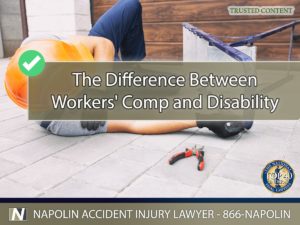The Difference Between Workers’ Compensation and Disability in California
Navigating the legal landscape of employment injuries in California requires a clear understanding of two pivotal support systems: workers' compensation and disability insurance. These mechanisms are designed to provide financial and medical support to individuals facing injuries or illnesses. However, their applicability depends on the nature and circumstances of the injury. This article delves into the nuances of both systems, offering detailed insights to empower those seeking assistance. By elucidating these distinctions, we aim to provide a comprehensive guide for injured workers in California.
Comprehensive Overview of Workers' Compensation in California
Workers' compensation is a state-mandated insurance program that provides benefits to employees who suffer job-related injuries or illnesses. In California, the Division of Workers' Compensation (DWC) oversees the administration of these claims, ensuring that injured workers receive necessary medical care, income replacement, and rehabilitation services. This system operates on a no-fault basis, meaning employees are entitled to benefits regardless of who was at fault for the injury. Coverage includes all medical costs directly related to the workplace injury, temporary disability benefits to compensate for lost wages, and permanent disability benefits if the worker suffers a lasting impairment. Additionally, workers' compensation provides death benefits to the dependents of workers who die from job-related injuries or illnesses.

Detailed Scope of Workers' Compensation Coverage
Detailed Scope of Workers' Compensation Coverage
The breadth of workers' compensation in California is extensive, covering a wide range of injuries and illnesses that occur in the course and scope of employment. This includes acute injuries from accidents, repetitive stress injuries, and occupational illnesses from exposure to harmful substances. However, there are specific exclusions, such as injuries incurred while the employee was committing a crime, under the influence of drugs or alcohol, or self-inflicted injuries. Moreover, injuries that happen during the commute to and from work are generally not covered under workers' compensation. The aim is to balance the needs of injured workers with the protection of employers from litigation, fostering a safer work environment.
Exploring Disability Insurance: Short-Term and Long-Term
Disability insurance serves as a financial safety net for individuals unable to work due to non-work-related injuries or illnesses. In California, disability insurance is divided into two main categories: short-term and long-term. Short-term disability insurance (SDI) provides temporary benefits for up to one year, offering financial assistance to those who are temporarily unable to perform their regular or customary work. Long-term disability insurance (LTD), on the other hand, kicks in after the expiration of short-term benefits, potentially extending support for several years, depending on the policy. Both types of disability insurance aim to replace a portion of the worker's income during the period of disability, ensuring financial stability.

Permanent Disability in California and Its Implications
Permanent Disability in California and Its Implications
Permanent disability benefits are a critical component of workers' compensation in California, designed for workers who sustain injuries resulting in permanent physical or mental limitations. These benefits are calculated based on the extent of the impairment, the worker's age, occupation, and the date of injury. Permanent disability is determined through a medical evaluation process that assesses the worker's residual functional capacity. The state provides a schedule for rating permanent disabilities, which is used to calculate the benefit amount. For those with permanent disabilities not fully covered by workers' compensation, Social Security Disability Insurance (SSDI) may offer additional support.
The Crucial Role of Legal Representation
The intricacies of workers' compensation and disability insurance claims can be overwhelming for injured workers. Legal representation is invaluable in navigating these complex processes, ensuring that claims are filed correctly, deadlines are met, and the injured party receives the maximum benefits they are entitled to. Experienced attorneys can also assist in appealing denied claims, representing clients in hearings, and negotiating settlements. For California workers facing the daunting task of dealing with workplace injuries, a knowledgeable legal advocate can be the key to a successful resolution.

The Difference Between Workers' Compensation and Disability in California
The Difference Between Workers' Compensation and Disability in California
The distinctions between workers' compensation and disability insurance in California are nuanced but crucial for anyone dealing with a workplace injury or illness. Understanding these differences is essential for securing the support and benefits necessary for recovery and financial stability. If you or someone you know is navigating this challenging landscape, Napolin Accident Injury Lawyer is here to help. With a deep understanding of California law and a commitment to our clients' well-being, we strive to ensure that injury victims receive the compensation and support they deserve. Contact us at (866)-NAPOLIN for a free consultation, and let us assist you in your journey toward recovery and justice.
- Understanding Uber Accidents and Insurance Coverage Periods in California - April 8, 2025
- A Guide on Red Light Auto Accidents in California - August 14, 2024
- Self-Representing in a California Personal Injury Claim - August 13, 2024
